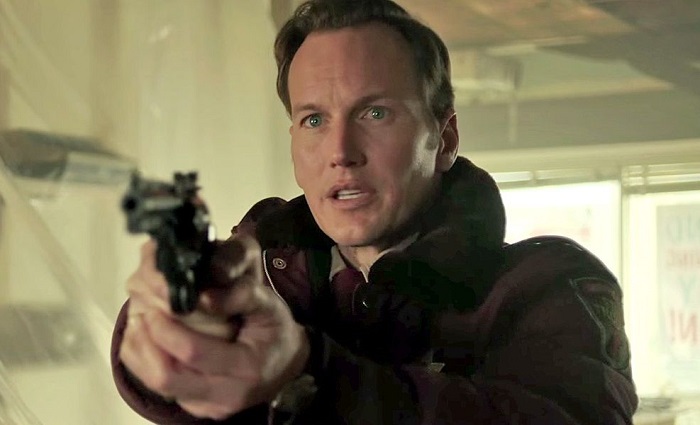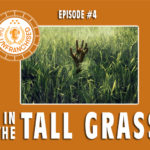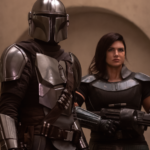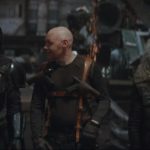
In any other televised crime drama, had a UFO swooped in like one giant dues ex machina from the sky causing its characters to gaze disbelieving upward before they all scatter off in different directions, I would have rolled my eyes so hard the resulting noise would have been audible. But FX's Fargo is not any other televised crime drama. It's a TV series so distinctive and assured of itself that when that UFO came roaring overheard during last week's penultimate episode of the second season, it felt like the only real option creator and showrunner Noah Hawley had available to him. After all, Hawley and his writers had been laying the groundwork all season, teasing the influence of extraterrestrials in the plotting and hiding little UFO references in the background of scenes. And those of us who watched and were delighted by season one were well aware that the Sioux Falls Massacre, once it finally arrived, had to be so momentous that it would change the life of at least one of its witnesses — Minnesota State Trooper Lou Solverson.
Sometimes, only a flying saucer will do.
Fargo, which wraps up its brilliant second season tonight, is the best television series currently in production. I suppose you could mount a stirring defense for Better Call Saul, but, honestly, in my mind, it's going to have to make a leap in its sophomore year to compete. A Fargo-esque leap, if you well. Because while Hawley's spinoff of the Coen brothers' classic 1996 film proved to be a surprising effective TV show last year — one that captured the specific dark humor of the film while telling its own compelling story — Fargo has reached a whole other level in its second season. Partly, it's because of the casting. Due to its anthologized nature, Hawley had to repopulate his universe in season two, and he did so by assembling an All-Star roster of capable actors. He nabbed a couple of talented big-screen stars in Kirsten Dunst and Patrick Wilson and gave them parts juicier than anything they'd been getting in movies these days. He took Jeffrey Donovan, a guy only known for being the pretty-faced lead in a paper-thin USA series, and turned him into a mob brute both hilarious and intimidating in his rash assertiveness. And he surrounded these people with a plethora of TV heavyweights, some of whom are doing their best work in years: Ted Danson and Jean Smart and Brad Garrett and Nick Offerman, just to name four. And I could keep going down the line of actors doing amazing work in Fargo, from Jesse Plemons to Cristin Milioti. Oh, and let's not forget Bokeem Woodbine, who's going to get plum parts for the next decade based off his work here as a chatty, philosophical mob goon.
But it's not just the cast. Clearly, the success of season one, which was already overly stylish and borderline weird compared to most cable TV dramas, has emboldened Hawley to push the envelope even further in season two. Last year, Billy Bob Thorton's devilish hitman appeared to have the ability to phase through walls when he needed to escape an enclosed room in a rush. So why not bring UFOs into play during season two to highlight the paranoia coursing through 1970s America? We've also gotten detailed hi-def recreations of scenes from classic Ronald Reagan movies, an appearance by Reagan himself as a character (played by cult icon Bruce Campbell natch) and a late-in-the-game narrative swerve that had season one's Martin Freeman dropping by to narrate a small stretch of this season's climax. On paper, all of these decisions must seem questionable. But in execution, they're elevating the show to heights not normally reached by TV series, even the good ones.
And you know what? Maybe that stuff doesn't work as well if the show's core doesn't hold up as a violent but funny crime caper. Because even removing the stylistic flourishes and weird sidebars, Fargo is telling a great story, one that's full of great dialogue and nifty plot twists. I would think it would appeal to anyone who found themselves wrapped up Walter White's machinations in Breaking Bad or Raylan Givens' adventures in Justified. There's great joy to be had in simply watching Ed and Peggy Bloomquist (Plemons and Dunst), a couple of young, daft Minnesotans, try to untangle themselves from the mess they find themselves after Peggy accidentally hits a mob boss' grandson with her car. Probably not the best first moves: Finishing the poor guy off in their garage and grinding his body up at the butcher shop where Ed works.
And the story Hawley is telling his year is also thematically strong, touching on such subjects as the corporatization of America (played out as a mob war between a large, organized Kansas City outfit and a small family of crooks being pushed aside by big money) and the noble effort of just trying to stay positive and productive in world that's beating you down on all sides. Because we meet an older Lou Solverson in season one, played by Keith Carradine, we know that Patrick Wilson's young Lou is not entirely successful on that front. But he sure is trying.
When Fargo was first announced, it seemed like folly. Attempting to adapt a style as idiosyncratic as the Coen brothers' was sure to lead to embarrassing failure. But Hawley has worked magic here, bringing the feel of the Coens' entire oeuvre to the series while creating something that's still unique and distinctly episodic. There is no greater sound on TV right now than the typewriter clacks that kick off each episode of Fargo this year. "THIS IS A TRUE STORY." It's really enough to give you goosebumps. Let's hope the season wraps up in strong fashion tonight … and that Hawley can repopulate his universe once more (although maybe not entirely!) and keep the good, weird times going in season three.











